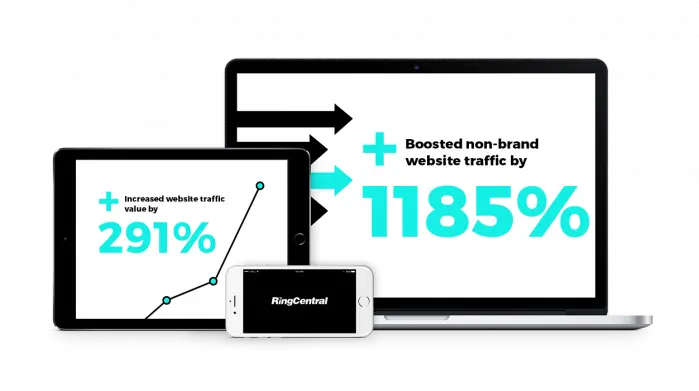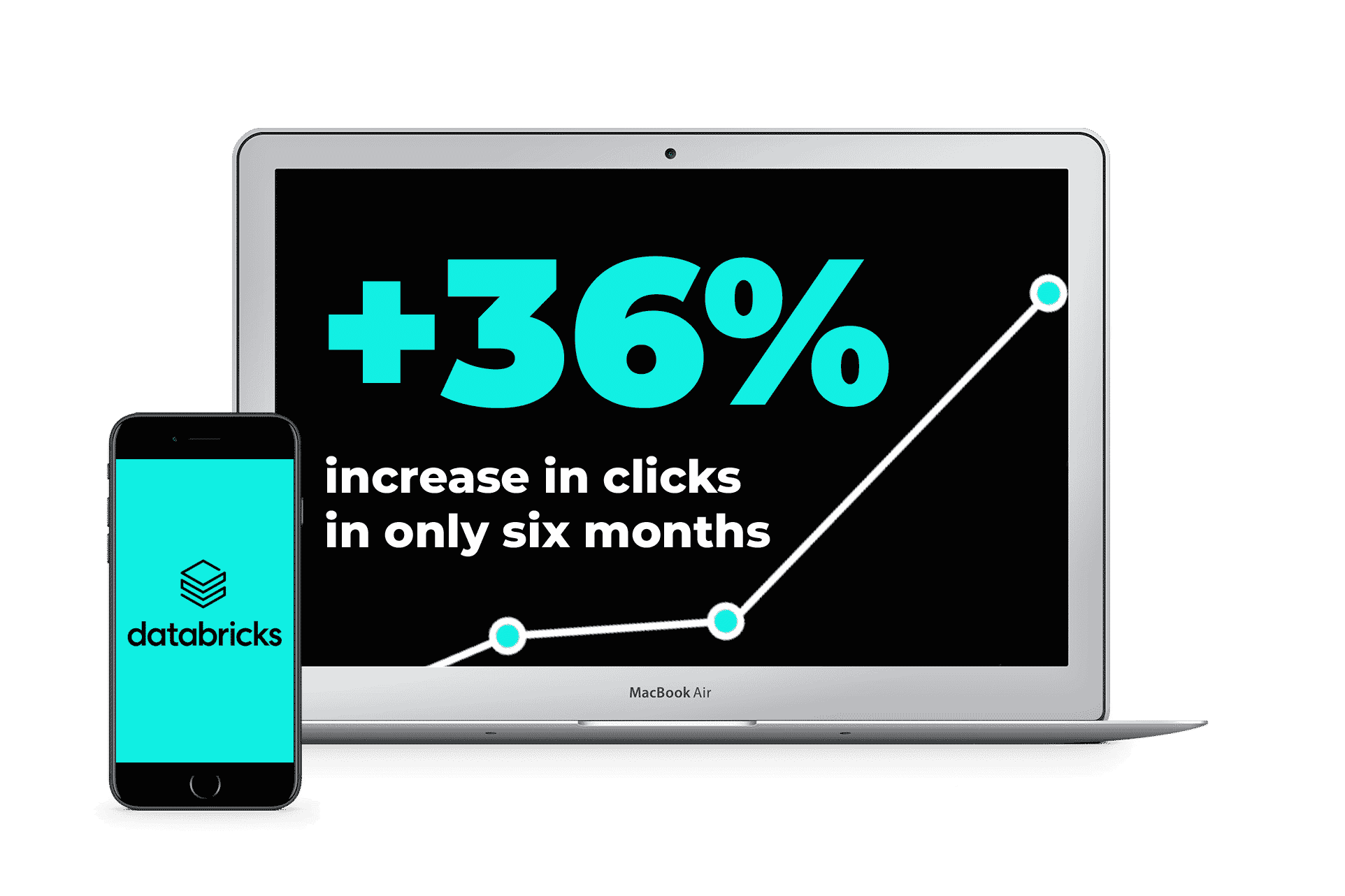We accelerate
your Enterprise
We accelerate
your
Enterprise Services
There’s a big difference between small business and Enterprise SEO. Whilst the principles are the same, the difference in scale of search is substantial – and this is where we excel. We understand what it takes to elevate Enterprise brands.
Our 360 search strategy is uniqly designed around your individual business goals, no matter how large or comprehensive, putting you in front of the audiences you want, and driving the results you need.

Enterprise SEO
Our holistic approach to search is even more beneficial for Enterprise-level brands. You're going up against goliaths to rank highly in your chosen SERPs. We combine technical, onsite, and offsite SEO to generate the impressions and traffic that truly convert into ROI.
Learn More
Enterprise Content Marketing
With our team of 50+ strong writers, editors and content producers, we can facilitate and produce rich, high-quality content at volume. Our content is fueled by data and human analysis, designed to connect with your audiences' demands and search intents, across all of your digital touchpoints. We have unparalleled relationships with high-authority domains who we work with to amplify your content's reach. In addition, and on behalf of our clients, we also secure content partnerships and collaborations further enhancing your brand's reputation and credibility.
Learn MoreWe help Enterprise companies increase their ROI by 20% month on month
Enterprise SEO is a very different ball game because it operates at scale. The market is more competitive, there are bigger challenges, more stakeholders, and legacy brand reputations on the line.
We work almost exclusively Enterprise companies because we understand your marketplace and your pain points and most importantly, we deliver results. Our SEO strategies provide you with a predictable and scalable revenue model.
A few of our satisfied clients




Enterprise FAQs
Enterprise marketing is more complex than marketing for startups or SMBS, for a number of reasons – the key one being the sheer volume of it. The marketing budget is often much larger, and implementing any new strategy requires the approval of lots of decision makers. While a small business can focus on a small niche, an enterprise level business is fighting in a much bigger market.
Scaling up to this level can often involve a lot of marketing automation, but it’s important not to neglect the customer experience. Balancing between large scale campaigns and a personal touch can be a real challenge, and it’s for this reason many enterprises outsource to a dedicated marketing company.
For instance, let’s take a look at an influencer campaign. A small business might only need to speak to two or three micro influencers in order to have a real impact on their lead generation – if they’re a startup, going from, say, twenty conversions a month to fifty would be a huge boost.
But for an enterprise, these numbers are near meaningless. They’re going to want influencers at the top of their game – and they’re going to want a lot of them. It’s not enough to have one person on the marketing team managing it. The sheer scale and volume of digital marketing strategies required by enterprise-level businesses is huge.
This applies to all marketing solutions, from social media advertising to inbound marketing. Luckily, with marketing automation, a dedicated team (and some help from a third party, like us!), and a clear understanding of who your customers are, you can easily handle this complexity and design some great strategies.
When it comes to marketing strategies for enterprise businesses, you need to factor in all the touchpoints your potential customers will encounter. It’s not enough to have a PPC ad campaign directing people to set landing pages. Instead, you need to meet your target audience where they are. Some key strategies to consider include:
Build brand awareness
Think about brands like Cadburys or Coca Cola. How many of their adverts are about the hard-sell – and how many are simply about reminding you they exist? At the enterprise level, you need to go beyond marketing a particular product or service. Instead, you need to market your brand.
Develop a consistent brand voice, tone, and imagery. This should be based on what your customer base relates to most – are you exclusive and luxurious? Cheap and cheerful? Build a brand identity, and watch new leads come to you.
Improve your inbound marketing
Content marketing is a key part of any enterprise marketing strategy, and with good reason. You want your website to draw people in, even when they’re not directly looking to buy things. A good content strategy should know how to create engaging, relevant and shareable content.
Build your reputation as a leader in your field. If you’re selling business software solutions, that might mean designing interesting infographics that people will post on LinkedIn. If you’re a makeup brand, fashion quizzes and behind-the-scenes tutorials might be better. Whatever you do, make sure the content you create is personalized to your audience.
Invest in SEO
This is where we can help! Your great content is no good if no-one sees it. Accelerate can help with your search engine optimization, making sure that when people search for relevant keywords, they’ll find you. We all know that being top of the search engine results is the goal, and ensuring your site is optimized is the way to do this.
Your customers are your best marketing tools
If a friend tells you they like something, you’re more likely to try it out, right? We all tend to trust the opinions of those we know over random advertisements online. So let your customers work for you – encourage them to leave reviews and testimonials, and share those on your website and social media. Influencer and affiliate marketing are part of this too – so make sure you’ve invested in this in order to take your strategy to the next level.
You might think that your marketing strategy is separate from your SEO – but you’d be wrong. The two link together very well, and making sure you’ve incorporated certain techniques into your strategy will help boost your rankings.
Firstly, there’s keyword targeting. Part of your strategy needs to be inbound marketing – and you do that through creating great content. This content needs to be suited to your target audience, but it should also be designed to meet search intent. What do we mean by that?
Let’s say you’re selling skincare products. When creating content, you should think about what people might search and why. There’s the obvious transactional keywords (‘cheap face cleanser’), but there’s also informational searches – ‘best cleanser for oily skin’. If you can create content that answers these informational queries, then you can draw people to your site. Hitting those keywords will help you rise up the rankings, and answering customer questions is a great marketing strategy.
Of course, it goes beyond that. Link building is another key part of SEO that you should incorporate into your marketing strategy. Backlinks are one of Google’s main ranking factors, so you need lots of them. Connecting with others in your field should be part of your plan, whether through outreach or partnerships. If your marketing team don’t have experience with this, an external company like Accelerate can step in and help.
Beyond these specific points, there’s another important way marketing can boost your search engine rankings: traffic. The amount of people viewing your website (and the amount who return to look at it again) will directly impact your rankings, so you want to get a lot of people in. An effective marketing campaign should draw people to your website, and boost this important metric.
Just make sure that when they visit, they stay. The time spent on your site is important too, so your website needs to be optimized and filled with interesting content. That way, when your strategy catches their eye and they come to take a look, they’ll end up reading around (and maybe making a purchase too)!
If you’ve implemented some new digital marketing strategies, but haven’t seen an improvement, there’s a few things that could be causing it. Before you get caught up in them, make sure you’re being patient. Digital marketing campaigns can take a while, especially if you’ve put a lot of your efforts into SEO rather than PPC.
Assuming you’ve taken that into account and are still worried, it’s time to figure out what’s wrong. The first thing to check is where the problem lies: are you getting visitors, but no conversions? Or are you simply getting no visitors? If it’s no visitors, the issue lies with your marketing campaign. If there’s no conversions, then it’s either something on your ecommerce site, or you’re getting the wrong type of visitors.
I’m getting no conversions
The first thing to check is that your ecommerce site works. No matter how great your email marketing, brand awareness or messaging is, if your site is unusable you won’t make sales. Check the basics – the add-to-cart button, the checkout process and whether the product pages load – and make sure everything works.
Next, check out some important metrics – at what point do potential customers bounce? Do they land on the page, and leave straight away? Or do they have a look around, maybe add things to their cart, and then bounce? If it’s the former, you might be targeting the wrong audience, or have a poorly designed website. If it’s the latter, it’s time to ask your customer base what’s stopping them. Follow up with surveys when possible – you might have too high a delivery charge, or perhaps you don’t accept certain payment methods.
Once you’ve checked all the technical and design issues, see if it improves. If it doesn’t, it’s time to reassess your marketing plan – you might have misunderstood your target audience, or be focusing on the wrong key words. You can take a similar approach to…
I’m getting no visitors
You’ve been posting on social media, your marketers are busy with content creation, but it doesn’t seem to be getting you anywhere. So what are you doing wrong? It’s likely you’re simply coming at it from the wrong angle. Go back over your online marketing plan, and consider:
- Do you know your target audience? Reassess your buyer personas – bringing in a dedicated marketing firm can help with this step if you’re struggling.
- Take another look at your content marketing. Is the content high-quality, engaging, and relevant?
- Have you targeted the right keywords? Go back through your content strategy and ensure you’ve picked out the right keywords – if you’re not sure about this, it’s something we specialise in and we’re always happy to help.

